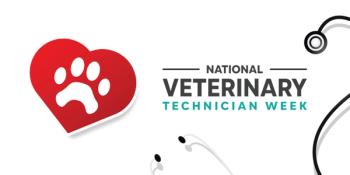
Lets get clinical: Top sessions for technicians at CVC Kansas City
Were taking the guesswork out of your CVC scheduling dilemmas. Heres a list of cant-miss clinical sessions (and on-topic resources you can use today).
All images courtesy of Getty Images and Shutterstock.comVeterinary technicians–we have some good news, some bad news and some more good news.
The good news:
The (sorta) bad news: You can't attend all of the awesome sessions (due to timing conflicts).
More good news: We've put together a list of our top clinical picks to serve as a starting point when creating the conference schedule of your dreams!
Check out the top sessions, organized by topic, on the following pages. You'll also find resources you can use right now in your practice.
Geriatric medicine and end-of-life care
CVC KC must-sees
The little things that make euthanasia better in clinics – Mary Gardner, DVM
Practical care for the geriatric patient – Mary Gardner, DVM
Right-now resources
Why these words aren't interchangeable and what this means for your veterinary patients.
Hospice and euthanasia are all about timing. Dr. Mary Gardner offers to guide clients through the process of their final gift to their pet-saying goodbye.
Dr. Dani McVety provides four guidelines for reframing.
Professional growth
CVC KC must-see
Body language for the veterinary team – Dani McVety, DVM
Right-now resources
Get a visual preview of this session by checking out this
Don't stay stuck in your career. There are plenty of doors waiting for you to open and explore.
Your emotional intelligence is key to becoming an effective leader at your veterinary practice. Start here on your emotional intelligence journey.
Watch this
Controlled substances
CVC KC must-see
Controlled substances: What you really need to know - Mary Berg, BS, RVT, RLATG, VTS (dentistry)
Right-now resources
What to document when dispensing controlled substances.
Try these eight quick tips to get inventory controls in place.
Practice management program
CVC KC must-see
Needs care, no $$$ ... now what? – Danielle Russ, LVT, BS, BA, AS
Right-now resources
See a sneak preview of this session as an
Two ways you can get your clients to agree to this needed yet expensive service.
Whether a client's pet is getting a cancer diagnosis, the pet owner is managing a chronic condition or they're visiting you for the very first time, here's how to nail best practices to show off your financial savvy when it comes to payments and maybe encourage folks to look into pet insurance down the line.
Public health
CVC KC must-see
If you cage creatures often enough … how to handle escapes – Jenifer Chatfield, DVM, DACZM
Right-now resources
Dr. Jenifer Chatfield says it's all about responsibility-for pet owners of all stripes and scales.
Help clients learn about the basics of zoonotic diseases and parasites with these five handouts on toxoplasmosis, hookworms, tapeworms, roundworms and Lyme disease.
Equine medicine
CVC KC must-see
You work in a dangerous profession! Teach your clients to teach their horses to be cooperative patients – Robert Miller, DVM
Right-now resources
Do you know how to properly use a twitch on your patients? Learn from the equine experts.
Be the hero your equine veterinarians need when it comes to conquering scheduling challenges.
How to manipulate a better outcome.
Read Dr. Robert Miller's beloved column.
Dentistry
CVC KC must-see
Advanced periodontal therapy: Let's save some teeth! – Benita Altier, LVT, VTS (dentistry)
Right-now resources
If your patient has a gray, pink, purple or blue tooth, don't just tell the owner to keep an eye on it. An intrinsically stained tooth is more than just a cosmetic issue, and the associated disease is often painful.
Mary Berg, RVT, RLATG, VTS (dentistry), demonstrates her preferred method of obtaining these images.
Visual examination, anesthetized probing and intraoral radiography can help you assess each patient's level of disease.
Orthopedics and rehabilitation
CVC KC must-see
Management of the down dog – Matthew Brunke, DVM, CCRP, CVPP, CVA
Right-now resources
Rehabilitation experts weigh in on why you should take this therapeutic modality seriously.
Check out this printable step-by-step guide to getting your orthopedic patients up and at 'em after injury or surgery.
Do your rehab services need some marketing rehab? Get in the underwater treadmill with us and we'll help flex those flabby client-acquisition muscles.
Cranial cruciate ligament tears and ruptures are common conditions that can lead to debilitating osteoarthritis. Consider a team approach to canine rehabilitation to improve every patient's quality of life.
Parasitology
CVC KC must-see
Neospora, Toxoplasma and coccidian: Microscopic monsters – Richard Gerhold, DVM, MS, PhD
Right-now resources
Get printable educational tools for clients and professionals.
Here's a look at each team member's role in educating clients about parasite control.
Sure, clients can get confused about vector transmission or a preventive's method of action, but have you ever been fooled? Dr. Richard Gerhold dispels some common misconceptions.
Toxicology
CVC KC must-see
Decontamination techniques: The old and the new – Tina Wismer,DVM, DABVT, DABT
Right-now resources
A golden retriever that ate a chocolate bar or a cat that was splashed with paint is presented to your clinic for evaluation. Do you know what to do?
Nearly half of the poisoning cases managed by Pet Poison Helpline involve human medications, so pass along this lifesaving information.
Fundamental toxicology tips and tricks for finding the source in small animal intoxications and possible malicious poisonings.
Behavior
CVC KC must-see
How do animals learn: What's all the psychobabble? – Beth Strickler, DVM
Right-now resources
Study evaluates the stress-reducing effect of playing different music genres for kenneled dogs.
Patients will tell you plenty about their emotional state if you simply pay attention.
Fast fixes for situational anxiety, panic and phobia.
Clinical program
CVC KC must-sees
How can I be a patient advocate in pain management for exotics and zoo animals? – Mary Goldberg, BA, LVT, CVT, SRA, CCRA
The technician's role in minimizing patient stress – Cynthia Otto, DVM, PhD
Right-now resources
Get advice for fixing the one-size-fits-all approach.
Take anxiety out of the equation with these veterinary products.
Use these tools to help clients recognize pain in their pets, to help you treat it and to help educate the entire practice on caring for pets in pain.
Wellness (Yours!)
CVC KC must-see
Top 10 tips: How to become a recovering perfectionist – Kimberly Pope-Robinson, DVM, CCFP
Right-now resources
Dr. Kimberly Pope-Robinson shares simple fixes to relieve anxiety caused by veterinary responsibilities.
If the pressures of veterinary practice are too much at times, here are some stories from colleagues who relate and resources that can help.
Knowing why you're struggling is important, so it's not helpful to label every negative experience in the veterinary profession as compassion fatigue. When Dr. Dani McVety took an honest look at how she was feeling, she realized her fatigue stemmed from making ethical decisions within the boundaries of clients' (often) illogical values or unreasonable budgets.
Newsletter
From exam room tips to practice management insights, get trusted veterinary news delivered straight to your inbox—subscribe to dvm360.






